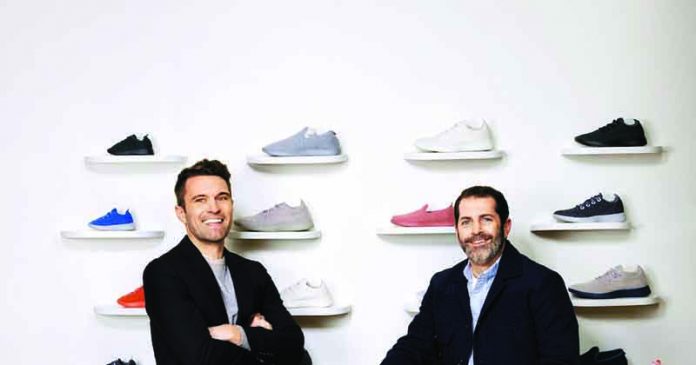The direct-to-consumer (D2C) model for manufacturers grew rapidly in 2018, with brands like Quip, Dollar Shave Club, and Warby Parker providing easy ways for consumers to purchase online and manage a close relationship with the brands they use.
With the D2C market becoming saturated, products and customer experiences must be exceptional to stand out and succeed. Especially for footwear, where it may seem impossible to win in an industry with corporate giants like Nike and Adidas.
Nevertheless, the U.S. shoe company Allbirds proved naysayers wrong with an eco-friendly and innovative D2C brand now valued at over $1 billion. We recently spoke to Joey Zwillinger, co-founder of Allbirds, to get some insight on what it takes to be one of the most innovative hypergrowth shoe brands and D2C sellers in the market.
Dylan Haviland: How did the company start?
Joey Zwillinger: Allbirds was founded out of a desire to make better things in a better way. My co-founder Tim was playing professional soccer in his native New Zealand, when he came up with the idea to make a simple, comfortable shoe out of wool. Our wives were college dormmates and remain great friends, and after years of Tim thinking about and working on this idea on his own, they suggested we chat.
I come from a renewable materials and engineering background, so together we were able to create a product that wasn’t just well designed and incredibly comfortable, it was actually kinder to the planet. Tim and I are co-CEOs, sharing the role traditionally reserved for a single person; Tim focuses mostly on product and our creative design, and I lead the operations, technology, and material R&D to continue our focus on our sustainable design with novel solutions to historically high-polluting supply chains.
What does it take to be an ‘innovative’ brand in 2019?
JZ: The courage to be bold, and to know that even a small company can make a very big impact on an industry as large as shoes ($80 billion+ in the U.S. alone). Product innovation takes time, so companies need to invest early and often—our sugarcane-based foam has been in development for three years! Needless to say, we have a lot of products and materials in the pipeline for the future, and we are incredibly excited about the experiences we plan to create for our customers.
What makes Allbirds an innovative brand in the D2C footwear industry?
JZ: We think of innovation in two ways. First is the way we interact with our customers, operating exclusively in a direct-to-consumer model with our entire business listening to feedback from consumers and improving our business as a result.
The second and most important aspect of innovation is related to our product. Especially in the footwear industry, innovation has historically meant adding new features, whereas at Allbirds, we try to distill products to their simplest form. This reductive design philosophy, coupled with novel (and sustainable) materials create a differentiated experience that our customers love.
Why do you think companies are increasingly moving toward a D2C model?
JZ: We can’t speak for the whole industry, but at Allbirds, our customers recognize that instead of paying a retailer to sell our products for us, we put that money right into the quality of every pair of shoes—this means that for a very reasonable price, customers can enjoy the amazing, premium materials that we use to make our products. We also believe that the feedback loop between us and our customers is critical, and the improvements we make to our product as a result resonate with our customers. For example, we’ve made over 35 changes to our original Wool Runner since it initially launched in 2016, almost all based on the concerns and experiences of our customers.
How is Allbirds able to compete in the tough footwear market?
JZ: Tim and I started Allbirds to create a stylish alternative that didn’t have the flashy logos and uncomfortable synthetics of other shoe brands. The response to our products has been beyond anything we could’ve ever imagined, and it shows that there’s a real appetite for simple, comfortable, and sustainable footwear.
Customers are increasingly looking for brands that can relate to their values. How does your brand mission resonate with customers on a personal level?
JZ: As a B Corp, our dedication to sustainability is written into our company charter. Regardless of customer demand, we see environmental conservation as non-negotiable and we prioritize it in each part of our business.
And while consumers are paying more attention to the provenance of what they’re buying, sustainability doesn’t necessarily drive purchase decisions. First and foremost, our customers buy our shoes because they look and feel great. We’re proving that customers don’t have to sacrifice on price or design in order to buy green products.
What steps do you take to ensure that customers will continue to come back to you?
JZ: The best way to make sure that customers return to your brand is to make great products. Though we believe it is critical to have top-notch customer support and social media teams so customers know where to go when they have a question, there’s no replacement for good design and execution.
What are the biggest challenges you see in the D2C space?
JZ: We don’t think that a direct-to-consumer model alone is sufficient to create a lasting brand. This is a wonderful way to sell products given the advances of technology, but without incredible product, the selling approach is not enough. And inventing really great, differentiated products is hard. It’s this challenge that we work on tirelessly every day.

